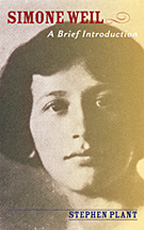Simone Weil (1909 - 1943) was a French philosopher, activist, and mystic whom T. S. Eliot called "a woman of genius, of a kind of genius akin to that of saints." Malcolm Muggeridge said of her, "In my opinion, the most luminous intelligence of the twentieth century." Stephen Plant, a Methodist minister and Director of Studies at Wesley House in Cambridge, England, is the author of this thought-provoking survey of her life and writings. He quotes one of her last letters:
"I have a sort of growing inner certainty that there is within me a deposit of pure gold which must be handed on. Only I become more and more convinced, by experience, and by observing my contemporaries, that there is no one to receive it. . . This does not distress me at all. The mine of gold is inexhaustible."
During her lifetime, most of her writings were almost unknown, even to those closest to her. From 1931 to 1934, Weil taught philosophy in a series of schools. But her unconventional teaching style and her activities outside school made her unpopular. Plant comments that she used most of her money on books and gave the rest of her salary to workers' strike funds. She refused heat in her room since the unemployed had to live in the cold. This tendency to empathize with the indigent, along with her tendency toward the ascetic life, grew out of her Christianity.
Plant discusses her writings in chapters on her understanding of God, loving God in a world of pain, the need for roots, and a consideration of her as the last Cathar. One of her major themes was grace. Here she states:
"We cannot take a single step towards the heavens. God crosses the universe and comes to us.
"Over the infinity of time and space, the infinitely more infinite love of God comes to possess us. He comes at his own time. We have the power to consent to receive him or refuse."
